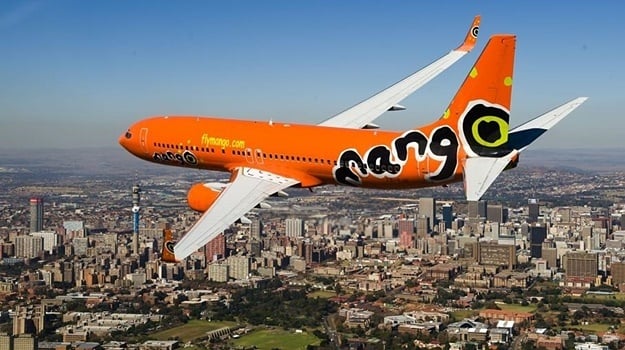
- ACSA temporarily suspended Mango from using its airports, but lifted the ban once some payment was made.
- Mango is a subsidiary of state-owned South African Airways, but unlike its parent company, it is not in business rescue.
- The Department of Public Enterprises has been trying to get R2.7 billion of the R10.5 billion allocated to SAA in the medium-term budget in October last year to go to its subsidiaries.
Following negotiations, Airports Company SA has lifted a suspension it imposed on Mango, where the low-cost airline was forbidden to use its airports due to outstanding debt, ACSA said on Wednesday.
ACSA said Mango made a partial payment on Wednesday towards the amount owed to ACSA for landing fees, parking fees, and passenger service charges. The airline has made further undertakings to settle the remaining debt.
"It is under these circumstances that ACSA has agreed to lift the suspension on Mango. The approach of ACSA to our business relationship with Mango is consistent with our approach to other airlines based on the terms and conditions entered into contractually, [the] details of which remain confidential," ACSA said in a statement.
ACSA also indicated that, should Mango fall behind again, its flights would once again be suspended.
Mango said earlier on Wednesday that it would be back up and flying on Thursday.
At the same time, it indicated that it is as yet unclear whether the airline would still be mothballed from 1 May as reported by Fin24 last week.
"We can confirm that our services and all flights are temporarily suspended for today only due to outstanding payments to ACSA. Senior management and our shareholder are locked in in emergency discussions to find an amicable solution to this impasse," the airline announced in the early afternoon.
"We ask for calm and patience as we navigate through these challenges. We will update the public as soon as possible."
The airline asked affected passengers to contact its call centre regarding cancelled flights.
Low-cost airline LIFT announced that it added extra flights to assist affected Mango passengers.
"Mango will be contacting and re-booking some of their affected passengers to travel on LIFT to ensure they can travel as planned. LIFT currently operates only on the Johannesburg-Cape Town route, but is also looking to assist with additional flights on other domestic routes," it said.
Fin24 reported a week ago that Mango looked likely to stop operating for a few months as from 1 May, according to internal communication seen at the time.
Mango is a subsidiary of state-owned South African Airways (SAA), but unlike its parent company, it is not in business rescue.
The internal Mango communication stated that the executives and board of Mango, as well as the interim board of its parent company SAA, decided on this step after having had to fend off creditors for the past six months and not being able to stall them any longer.
SAA's shareholder, the Department of Public Enterprises (DPE), has been trying to get R2.7 billion of the R10.5 billion allocated to SAA in the medium-term budget in October last year to go to the airline's subsidiaries Mango, SAA Technical and AirChefs. Treasury requires Parliament to make a special allocation in this regard before the R2.7 billion can flow to subsidiaries.
According to the document, the DPE has been asked to consider putting Mango in business rescue, just like SAA.
Another document seen by Fin24 last week, from Mango acting CEO William Ndlovu and addressed to employees, states that at the beginning of April 2021, the airline was informed that Mango would only receive funds in June 2021.
"This put Mango in a difficult situation as it relates to further extension from the creditors who could not wait any longer to be paid," says Ndlovu. "The lessors then put an ultimatum to Mango that should they not receive their money by 30 April 2021, then all their aircraft must be grounded until such time that Mango receives the funds and is able to pay."
The DPE told Fin24 at the time that it was in discussions with the boards of Mango and SAA about the repositioning of the subsidiaries in light of the delayed funding.
